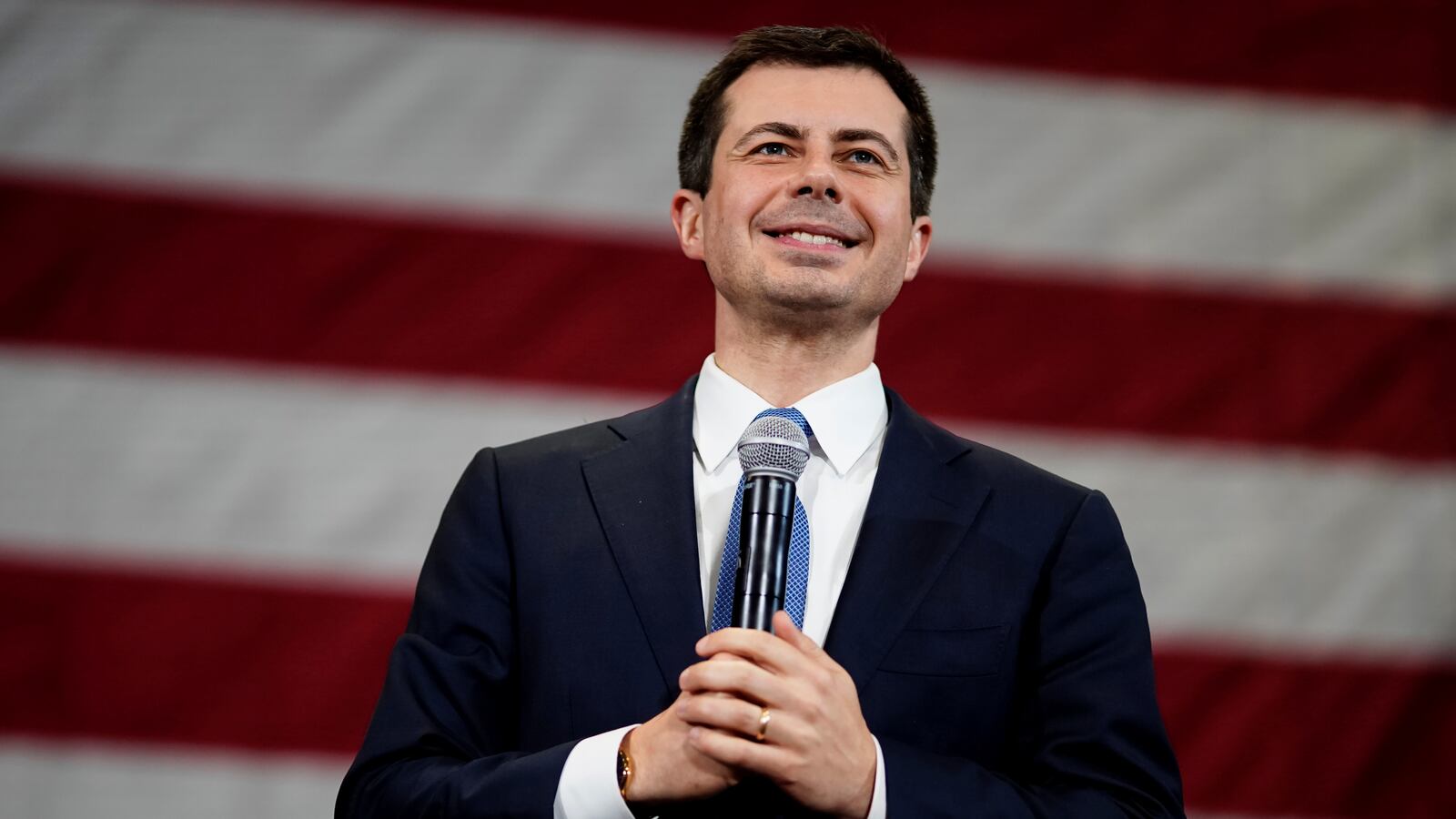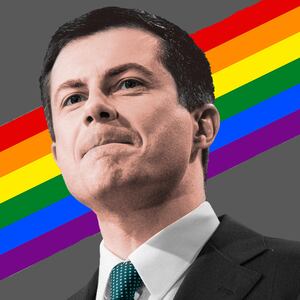Former South Bend Mayor Pete Buttigieg dropped out of the presidential race on Sunday night, ending a historic presidential bid that went from novelty to legitimate threat to some of the biggest names in Democratic politics before running into the harsh realities of the nomination process.
“Tonight, I am making the difficult decision to suspend my campaign for the presidency,” Buttigieg said. “I will do everything in my power to ensure that we have a new Democratic president come January.”
Multiple campaign aides had confirmed the move to The Daily Beast ahead of Buttigieg’s formal announcement at an event in his hometown of South Bend, Indiana.
“Pete is heading back to South Bend and will give a speech tonight suspending his campaign,” said an aide. “He believed we could build something bigger than any single person and that is what he did.”
The former mayor of Indiana’s fourth-largest city began his race with, even longtime aides admitted, slim hopes of building the fundraising apparatus and ground operation needed to win a modern campaign. But riding a wave of often glowing media coverage that centered on his unlikely biography as a Harvard-educated gay veteran and Rhodes Scholar, Buttigieg’s team created one of the most successful start-up presidential campaigns in modern memory, eventually winning the most delegates in the Iowa caucuses and finished an unexpectedly close second to Sen. Bernie Sanders (I-VT) in the New Hampshire primary.
Buttigieg acknowledged the history-making nature of his candidacy as the first openly gay person to win a nominating contest in American history in his remarks on Sunday, telling the audience of supporters, staff and family that “we sent a message to every kid out there wondering if whatever marks them as different means that they are somehow destined to be less-than.”
But Buttigieg faltered in the subsequent two contests, Nevada and South Carolina, where the demographic limits of his mostly white base were tested and failed.
The latter primary, in particular, was a difficult one, with Buttigieg gaining only a small percentage of the African American vote, confirmation of a longstanding difficulty the candidate faced in earning the support of that voter demographic. Buttigieg, who styled himself as a mild-mannered Midwesterner who could still bring about progressive chance in Washington, was a darling of white, college-educated Democrats but failed to connect with nonwhite voters.
Critics frequently pointed to Buttigieg’s failure as a mayor to address racial problems he vowed to solve as president, critiques that were made manifest with his poor showing among Latino voters in Nevada and black voters in South Carolina.
“Pete has a black problem,” Rep. Marcia Fudge (D-OH), the former chairwoman of the Congressional Black Caucus, told The Daily Beast last year. “I don’t know of one black person out of Indiana that supports him.”
More liberal voters, too, expressed increasingly public disdain for Buttigieg’s gold-plated résumé and well-heeled fundraisers, evidence, they felt, that he was a creation of the very systems that had brought about the election of President Donald Trump.
“The mayor just recently had a fundraiser that was held in a wine cave full of crystals and served $900-a-bottle wine,” said Sen. Elizabeth Warren in a debate last December. “Think about who comes to that.”
Despite those major demographic challenges, Buttigieg’s campaign outlasted those of senators, governors, and longtime household names within the Democratic Party. In the year since he first announced his unlikely exploratory committee with an email list of less than 20,000 people and nearly zero name recognition outside of his own small city, Buttigieg raised more than $100 million from more than 800,000 supporters. At just 38 years old and with a national network of powerful supporters, Buttigieg is likely to remain a fixture in party politics for years to come.
But his surprise victory in the Iowa caucuses, rather than kickstarting a winning momentum for Buttigieg’s campaign, instead was the beginning of a long slide from frontrunner status to the second tier in a shrinking field. His campaign subsequently faced a difficult choice: to stay in the race through the slate of contests on Super Tuesday or to drop his bid with some hope that his voters could flock to a more viable moderate-minded candidate.
A campaign aide declined to say that Buttigieg was dropping out for the purposes of bolstering former Vice President Joe Biden heading into the next wave of primaries. But the aide hinted as much.
“He got into the race because our politics were not working, Washington wasn’t able to deliver solutions for everyday Americans and systemic issues demanded urgent action,” said the aide. “And those are the same reasons why he is suspending his campaign. He believes it is the right thing to do for our country and what we need to do to heal a divided nation.”
A second aide later confirmed that Buttigieg had exchanged voicemails with Biden while en route to South Bend on Sunday, although would not elaborate on the nature of the messages from either candidate.
Buttigieg informed his campaign staff that he was suspending his campaign around 5:30 p.m. on Sunday. He is expected to speak later in the evening.
Voters at a Sunday evening rally for Biden in Virginia Beach, however, told The Daily Beast that for them, Buttigieg’s loss is most meaningful for what it could mean for Biden’s own bid.
Lamonte Hazelle, a 63-year-old lawyer from Chesapeake, speculated Buttigieg could give Biden’s bid a boost.
“I don’t think he was a major factor,” Hazelle said. “I know a lot of people in the black community didn’t recognize his name. Personally, I liked his ideas, but it’s not his time yet.”
“Definitely,” Hazelle said when asked if Buttigieg would be a big get for Biden, arguing he could bring a lot of “younger conservative voters” over to the former veep’s side.








